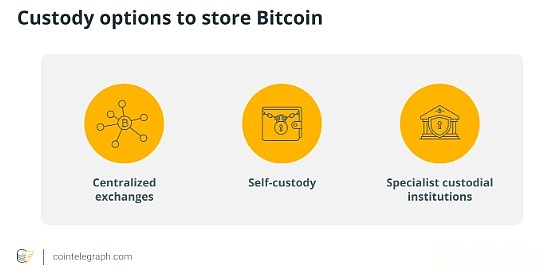
Author: RK Subramanian, CoinTelegraph; Compiled by: Tao Zhu, Bitchain Vision
1. The importance of Bitcoin custody
Bitcoin is a decentralized cryptocurrency that is widely regarded as digital gold for its ability to store value.As industry experts predict that Bitcoin prices will reach astronomical numbers, users and investors must prepare and execute a good custody plan.
Bitcoin (BTC) remains a hot topic of discussion, with growing institutional interest and multiple spot BTC ETFs approved to allow traditional investment companies to offer Bitcoin to their clients.
Users own Bitcoin or gain exposure to such assets in a variety of ways, from investing in ETFs to holding Bitcoin through centralized exchanges, and exploring self-custody options directly or through institutions or third parties.
Individuals need to choose the right custody solution that best suits their custody risk preferences and investment and regulatory status.When holding Bitcoin, they have roughly the following options:

2. Bitcoin holdings in centralized exchanges
Centralized exchanges are considered an entrance for retail investors to enter the cryptocurrency space, and it’s no surprise that some users may consider them a convenient option for holding Bitcoin.
Reputable centralized exchanges such as Coinbase and Kraken operate to high standards due to their jurisdiction and regulatory and legal compliance.Retail users attracted by cryptocurrencies often start their journey by opening their first account on a centralized exchange.
These agencies can join users after the necessary Know Your Customer (KYC) check and provide simple introductory trading solutions to support the purchase of cryptocurrencies through fiat currencies.Users who prefer the centralized trading experience may leave their Bitcoins on their trading account, making the selected cryptocurrency exchange their default custody provider.
This option does have some drawbacks and users should be familiar with the risks of this approach, which may include a complete loss of assets due to hacking or exchange bankruptcy.
3. Bitcoin self-custody options
Bitcoin self-custody represents a scenario in which users assume full responsibility and ownership of the Bitcoin they own, which has its own advantages and disadvantages.The key to self-hosting is to protect the private key that controls the user’s wallet.
For mature users who believe in the popular motto of “not your key, not your cryptocurrency” in the cryptocurrency ecosystem and are willing to put in some extra effort to set up self-hosting options, here are some potential ways to do:
Private hot wallet
Private hot wallets range from mobile devices to desktop solutions, where users can set up wallets and protect private keys to control assets within that wallet.These are often referred to as hot wallets because they maintain a connection to the internet and can interact with multiple decentralized applications (DApps) to perform regular transactions.However, it is not wise to store a large amount of Bitcoin in a hot wallet.
Private hardware wallet
Hardware wallets are often considered cold wallets because they only interact with external applications when needed.Security-conscious users can benefit greatly by using hardware wallets as a cold storage solution for Bitcoin.Cold storage wallets may help users avoid malicious contracts, hacker attacks, etc.
4. Security measures for self-custody of Bitcoin
Users who choose the self-hosting option must ensure that best practices are followed to protect their assets.
Private key storage
For users who own a private wallet, their private key is the only way to control assets associated with their addresses.They must protect it at all costs and avoid exposing it to unknown parties.Because private key records are critical, users should not store them in plain text on their devices or computers, as this can expose their identities in the event of a security breach.
Paper wallets provide an easy start for secure key storage, but consider durable metal solutions for ultimate protection.They specifically engrave the user’s private key or mnemonic words onto fire and flood-proof metals, ensuring your crypto assets are protected for a long time.
Multi-signature wallet
Multi-signature wallets provide an additional layer of protection, and multiple people need to sign transactions to transfer any bitcoin within the underlying wallet.These are standard measures in cryptocurrency project vaults or decentralized autonomous organizations DAOs to prevent damage to individual wallets or individuals.Still, security-conscious retail users can adopt them, and they can invite family and friends to provide an additional layer of security.
Hosting agencies and third parties
For organizations and high net worth individuals (HNWI), relying on reputable third parties to protect their assets is a smart way to meet many of their regulatory and compliance commitments.
Digital Asset Custody Services reflect existing stocks, precious metals and artistic models.
Well-known institutions such as Coinbase and BitGo provide digital asset custody solutions.These entities are certified as custodians under the laws and regulations of their jurisdictions.They adhere to very high standards in security measures, insurance, audits and compliance to meet the requirements of institutional investors and wealthy people.
These custodial solutions feature a range of physical security, cold storage, operational security workflows and access controls to protect the bitcoin entrusted to them.They can also provide users with clear reporting and holdings regularly to maintain a high level of transparency.
Ownership, jurisdiction and tax saving structure
Ownership jurisdiction and holding structure can significantly influence a person’s cryptocurrency custody options.Considering these factors and the technical aspects of custody is essential to keep your assets safe and legal and compliant.
Global institutions holding Bitcoin are sometimes complex legal entities in terms of their jurisdiction and holding companies.Similarly, family offices or wealthy people can choose to hold Bitcoin through holding companies or trusts in different jurisdictions, which will affect the potential custody solutions available to them.
These structures are driven primarily by privacy and tax efficiency advantages; however, users must ensure that the custody options they choose are legal and compliant by seeking appropriate advice from financial and legal experts.








